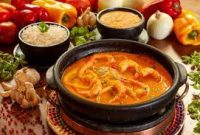The advantages and disadvantages of Brazilian food and why it’s so popular
Brazilian food
Both Advantages and Disadvantages:
Brazilian food offers a wide range of flavors and ingredients, and while it appeals to both natives and visitors in many ways, there are a few potential downsides to consider as well:
Advantages of Brazilian food:
Brazilian cuisine is recognized for its rich, varied flavors that are influenced by a wide range of cultures and geographical regions. There are many diverse flavors and cuisines to sample as a result of this diversity.
Fresh ingredients: To create vibrant and flavorful meals, many Brazilian dishes employ fresh ingredients that are locally sourced. Examples include tropical fruits, vegetables, meats, and seafood.
Brazilian food is a vital part of the country’s identity and a source of national pride because it symbolizes the country’s diverse cultural heritage.
Brazilian cuisine is regularly provided during social gatherings and festivals, which promotes friendliness and camaraderie. Friends and family frequently get together for supper.
Regional Variations: Due to Brazil’s breadth and varied topography, a large variety of regional specialties have developed, making the country’s cuisine both distinctive and authentic.
People from all walks of life may access a broad variety of delicious and inexpensive snacks and meals because to Brazil’s growing street food culture.
Brazilian food is rich in fresh fruits, vegetables, lean proteins, and other nutrients. Grilled meats and aça bowls are two examples of meals that might be nutritious choices.
Cons of Brazilian cuisine:
Rich-Calorie Dishes: Traditional Brazilian foods like feijoada and coxinha can be high in calories and fat, making them inappropriate for those following a low-calorie diet or those who must adhere to certain dietary rules.
Dendê (palm oil) Use: Although dendê, or palm oil, is a common ingredient in Brazilian cuisine, using unsustainable production techniques to make it can have a detrimental ethical and environmental impact.
Foods that have been processed: Like many modern cuisines, Brazilian cuisine has experienced an increase in the consumption of fast food and processed foods, which can be unhealthy if consumed in excess.
Foods from the northeastern region of Brazil, in particular, can be particularly hot. While some may consider this advantageous, many others with sensitive palates could find it challenging.
Options for vegetarians and vegans may be limited because traditional Brazilian cuisine usually emphasizes animal dishes. Nevertheless, plant-based substitutes and adaptations are widely accessible.
Brazilians frequently consume enormous quantities, which, if improperly handled, could lead to overeating. Some patrons can find it difficult to control portion sizes when dining out.
Food safety: While Brazil’s laws on food safety have improved, some areas and businesses might not adhere to international food safety standards. The choice of a restaurant should be made carefully by tourists.
Brazilian food offers a rich and varied gastronomic experience with many advantages thanks to its vibrant flavors, cultural relevance, and regional variations. However, while making choices based on personal tastes and nutritional requirements, it’s important to consider any potential disadvantages, such as calorie-dense foods and environmental issues.

why it’s so well-liked
For a variety of reasons, Brazilian cuisine is popular both domestically and internationally:
Brazilian cuisine is well known for its extensive range of flavors and ingredients. As a result of the merging of influences from various civilizations, including indigenous, Portuguese, African, and immigrant cultures, there are many diverse tastes and dishes.
Food plays a significant role in Brazilian culture and is intricately linked to its traditions and history. Brazilian food is a source of national pride and a way for people to reconnect with their ancestry.
Brazil is a huge country with a diverse geography, thus there are many different regional specializations. Every region of Brazil has its own distinct cuisine and culinary traditions, giving visitors and residents a rich and diverse culinary experience.
Brazilian cuisine is commonly associated with social gatherings, festivals, and other sorts of celebrations. Eating meals together with friends and family is a common and cherished tradition that fosters a sense of community and hospitality.
Many Brazilian recipes feature fresh, locally sourced items such tropical fruits, vegetables, meats, and seafood. Brazilian cuisine is extremely vibrant and delicious, which can be attributed to the emphasis on fresh ingredients.
Brazil’s street food scene is flourishing, with several food carts and independent vendors offering a wide variety of delectable and inexpensive snacks and meals. The street food is available to people from all walks of life.
The food of Brazil has gained popularity and recognition worldwide.
Brazilian food is rich in fresh fruits, vegetables, lean proteins, and other nutrients. Shellfish, grilled meats, and aça bowls can all be nutritious choices.
Brazilian chefs and food entrepreneurs are constantly creating new recipes and adapting old ones to fit contemporary preferences and dietary requirements. As a result of this creative approach, Brazilian cuisine continues to be alluring and modern.
Travelers seeking really genuine dining experiences are increasingly drawn to Brazilian cuisine. Culinary tourism, which includes food excursions, cooking classes, and dining at local restaurants, is now a viable way to experience Brazilian culture.
Promotion of Food Culture: The Brazilian government and organizations have actively promoted Brazilian cuisine and culinary traditions through campaigns, festivals, and other means in order to boost the attractiveness of Brazilian cuisine.
Restaurant Scene: The restaurant scene is thriving and active in major Brazilian cities, with a variety of fine dining establishments, casual diners, and fusion restaurants.
In conclusion, the success of Brazilian cuisine can be attributed to its cultural relevance, regional diversity, social and festive components, as well as its ability to appeal to both national and international tastes. It keeps evolving and becoming more well-known on the global culinary scene.



